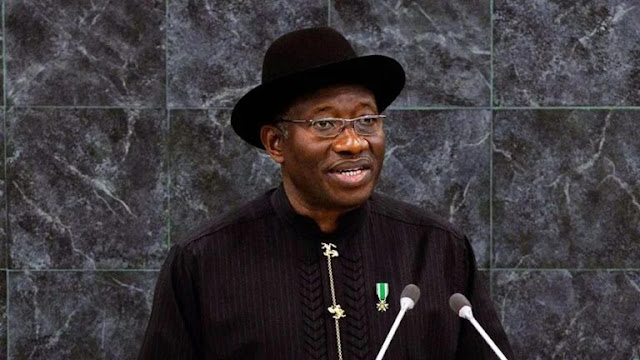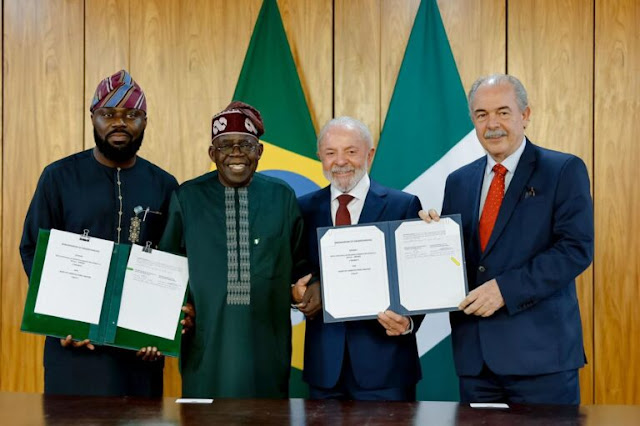The Lagos State chapter of the All Progressives Congress (APC) has categorically dismissed speculations that former President Goodluck Jonathan could stage a political comeback in the 2027 Nigerian presidential election. In a strongly worded statement issued on Friday, August 29, 2025, the party’s spokesman, Seye Oladejo, declared that Jonathan’s chances of unseating President Bola Tinubu are negligible, asserting that the former president’s political relevance in contemporary Nigeria is questionable. The statement reflects the APC’s confidence in Tinubu’s leadership and its determination to counter narratives that could undermine the party’s agenda as the 2027 elections loom.
Oladejo’s remarks come amid growing rumors and media speculation about Jonathan’s potential return to the political stage, fueled by his enduring reputation as a statesman and his perceived neutrality in Nigeria’s polarized political landscape. However, the Lagos APC argues that nostalgia for Jonathan’s era and his symbolic role in Nigeria’s democratic history are insufficient to address the nation’s pressing challenges. The party’s dismissal of Jonathan’s candidacy is not only a defense of Tinubu’s presidency but also a broader commentary on the direction Nigeria must take to achieve sustainable progress.
Goodluck Jonathan’s Legacy: A Mixed Record
To fully grasp the context of the APC’s statement, it’s essential to revisit Goodluck Jonathan’s tenure as Nigeria’s president from 2010 to 2015. Jonathan, a zoologist-turned-politician from Bayelsa State, rose to prominence as a relatively unassuming figure in Nigerian politics. He assumed the presidency in 2010 following the death of President Umaru Musa Yar’Adua, under whom he served as vice president. Jonathan’s ascension was historic, marking the first time a southerner from the Niger Delta region held Nigeria’s highest office. His subsequent victory in the 2011 presidential election solidified his position as a key figure in the People’s Democratic Party (PDP), which had dominated Nigerian politics since the return to civilian rule in 1999.
Jonathan’s presidency is often remembered for its highs and lows. His most celebrated achievement came in 2015, when he became the first incumbent Nigerian president to concede defeat in a presidential election, paving the way for a peaceful transition of power to Muhammadu Buhari of the APC. This act earned Jonathan widespread acclaim both domestically and internationally, cementing his reputation as a democrat committed to the stability of Nigeria’s fragile democracy. Oladejo acknowledged this legacy in his statement, noting, “While we acknowledge the former president’s role in the peaceful democratic transition of 2015, which rightly earned him praise at home and abroad, Nigeria has since moved beyond the politics of sentiment, nostalgia, and symbolism.”
However, the APC’s statement also highlights the criticisms that have shadowed Jonathan’s presidency. Oladejo accused the Jonathan administration of leaving behind “severe structural weaknesses” that continue to haunt Nigeria. These include rampant corruption, escalating insecurity, and economic stagnation—issues that plagued the country during Jonathan’s tenure. The Boko Haram insurgency, which intensified in the early 2010s, exposed vulnerabilities in Nigeria’s security apparatus, while allegations of widespread corruption, particularly in the oil sector, tarnished Jonathan’s government. The infamous “missing” $20 billion from the Nigerian National Petroleum Corporation (NNPC), as alleged by former Central Bank Governor Sanusi Lamido Sanusi, became a lightning rod for critics who argued that Jonathan’s administration lacked the resolve to tackle graft.
Economically, Jonathan’s presidency coincided with a period of global oil price volatility, which strained Nigeria’s oil-dependent economy. While initiatives like the YouWin program aimed to empower young entrepreneurs and the agricultural reforms under Minister Akinwumi Adesina showed promise, critics argue that Jonathan’s government failed to diversify the economy or address systemic issues like power generation and youth unemployment. These shortcomings, according to the Lagos APC, make a return to Jonathan’s leadership untenable in the face of Nigeria’s current challenges.
Tinubu’s Reforms and the APC’s Vision for 2027
The APC’s dismissal of Jonathan’s potential candidacy is as much a defense of President Bola Tinubu’s leadership as it is a critique of the former president. Since assuming office in May 2023, Tinubu has embarked on an ambitious reform agenda aimed at addressing Nigeria’s longstanding economic and structural challenges. His administration’s policies, including the removal of fuel subsidies and the liberalization of the foreign exchange market, have sparked both praise and controversy. While these measures aim to reduce fiscal burdens and attract foreign investment, they have also led to inflation and increased living costs, fueling public discontent in some quarters.
Oladejo’s statement reflects the APC’s determination to frame Tinubu’s presidency as a forward-thinking project that contrasts with what the party describes as Jonathan’s “imperfect past.” “The challenges facing the country require bold and forward-thinking leadership,” Oladejo argued, positioning Tinubu as the architect of a transformative era. The APC’s focus on consolidating Tinubu’s reforms underscores the party’s strategy to project continuity and stability as it prepares for the 2027 elections.
The Lagos APC also emphasized the need for “fresh ideas” and “credible candidates who reflect the aspirations of Nigeria’s youthful population.” With over 60% of Nigeria’s population under the age of 30, the youth demographic is a critical factor in the country’s political future. Tinubu, a seasoned politician and former governor of Lagos State, has sought to appeal to this group through initiatives like the Student Loan Scheme and investments in technology and innovation. However, his administration’s ability to deliver tangible results before 2027 will be crucial in maintaining the APC’s dominance.
Constitutional and Political Hurdles for Jonathan
Beyond the APC’s critique of Jonathan’s political relevance, Oladejo raised practical concerns about the feasibility of a Jonathan candidacy. The Nigerian Constitution limits presidents to two terms, whether consecutive or non-consecutive. Jonathan served as president from May 2010 to May 2015, a period that technically spans more than one term due to his assumption of office following Yar’Adua’s death. While legal scholars debate whether Jonathan is constitutionally eligible to run again, Oladejo’s statement suggests that the APC views this as a significant hurdle. “Any attempt by Jonathan to return would face constitutional and political hurdles,” he noted, signaling the party’s readiness to challenge such a bid on legal grounds.
Politically, Jonathan’s position is equally complex. Since leaving office, he has maintained a relatively low profile, focusing on international diplomacy and his role as a peace advocate in Africa. His occasional interactions with APC leaders, including President Tinubu, have raised eyebrows, with some speculating that he could be courted by the ruling party as a consensus candidate. However, Oladejo questioned Jonathan’s political alignment, pointing to his “occasional closeness to the APC and absence from the PDP’s rebuilding efforts.” The PDP, which has struggled to regain its footing since losing power in 2015, has not publicly endorsed Jonathan as a potential candidate, further clouding his political prospects.
The Role of Sentiment in Nigerian Politics
A central theme of the APC’s statement is its rejection of “the politics of sentiment, nostalgia, and symbolism.” Nigeria’s political history is replete with examples of emotional appeals shaping electoral outcomes, from ethnic and regional loyalties to reverence for historical figures. Jonathan’s 2015 concession, for instance, endeared him to many Nigerians who saw his actions as a rare display of statesmanship in a country where power transitions are often contentious. His humility and accessibility during his presidency also contrasted with the more austere personas of some of his predecessors and successors.
However, Oladejo’s statement reflects a growing sentiment within the APC that Nigeria’s challenges—ranging from insecurity to economic hardship—require pragmatic solutions rather than emotional appeals. “Emotion cannot drive economic reform, and sentimentality will not fix power generation, insecurity, youth unemployment, or education sector decay,” he asserted. This critique is aimed not only at Jonathan but also at any political forces seeking to capitalize on his legacy to challenge the APC’s dominance.
The emphasis on transformative leadership also speaks to the broader evolution of Nigerian politics. The rise of social media and an increasingly vocal youth population have shifted the political discourse, with greater scrutiny on governance and accountability. Movements like #EndSARS in 2020 highlighted the frustrations of young Nigerians with systemic issues, including police brutality and economic inequality. For the APC, positioning Tinubu as a leader capable of addressing these issues is critical to maintaining its electoral base.
Nigeria’s Political Landscape in 2025
As Nigeria approaches the 2027 elections, the political landscape remains fluid and unpredictable. The APC, having held power since 2015, faces the challenge of sustaining its dominance amid economic challenges and public dissatisfaction. Tinubu’s reforms, while ambitious, have yet to deliver widespread benefits, and the opposition—primarily the PDP and the Labour Party—has sought to capitalize on public discontent. The emergence of Peter Obi as a formidable force in the 2023 elections, driven by his appeal to young voters and his outsider status, has added a new dimension to Nigeria’s political contest.
Jonathan’s potential candidacy, whether real or speculative, adds another layer of intrigue. His cross-regional appeal, rooted in his Niger Delta background and his record as a unifier, could theoretically position him as a consensus candidate in a divided nation. However, the APC’s statement makes it clear that the party views such a scenario as unlikely and undesirable. By framing Jonathan’s era as a period of “severe structural weaknesses,” the APC seeks to shift the narrative away from his personal legacy and toward the broader need for systemic change.
The Broader Implications for Nigerian Democracy
The Lagos APC’s statement is more than a rebuttal of Jonathan’s rumored ambitions; it is a reflection of the evolving dynamics of Nigerian democracy. The rejection of nostalgia and sentiment underscores the party’s belief that governance must be rooted in measurable outcomes rather than symbolic gestures. At the same time, the emphasis on Tinubu’s reforms highlights the challenges of implementing bold policies in a country grappling with immediate economic pressures.
Jonathan’s legacy as a peaceful democrat remains a powerful symbol, but the APC’s critique raises important questions about the balance between legacy and governance. Can a leader’s past achievements outweigh their shortcomings in addressing present challenges? How should Nigeria weigh the contributions of elder statesmen against the need for fresh perspectives? These questions will likely shape the discourse as the 2027 elections draw closer.
For Jonathan, the APC’s dismissal may not mark the end of his political relevance. His international stature and domestic goodwill ensure that he remains a respected figure, even if his path to the presidency is fraught with obstacles. For the APC, the challenge lies in translating Tinubu’s vision into tangible results that resonate with Nigerians across all walks of life.
Conclusion
The Lagos State APC’s rejection of Goodluck Jonathan’s potential candidacy in the 2027 presidential election is a strategic move to reinforce President Bola Tinubu’s leadership and dismiss narratives that could undermine the party’s agenda. By questioning Jonathan’s political relevance and highlighting the shortcomings of his presidency, the APC seeks to shift the focus to its vision of transformative governance. At the same time, the statement acknowledges Jonathan’s contributions to Nigeria’s democracy while asserting that nostalgia alone cannot address the nation’s complex challenges.
As Nigeria navigates economic hardship, insecurity, and the aspirations of its youthful population, the 2027 elections will serve as a critical test of the APC’s ability to deliver on its promises. For Jonathan, the speculation surrounding his candidacy may be a reminder of his enduring legacy, but the APC’s message is clear: the future of Nigeria lies in bold, forward-thinking leadership, not a return to the past.






